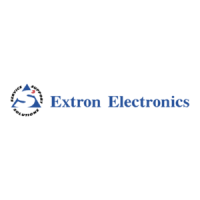IPCP Pro Series • Hardware Features and Installation 8
Mount and Cable All Devices
Mount the unit to a rack or furniture (see Mounting the IPCPPro Series on
page11).
Cable devices to the control processor (see Rear Panel Features and Connections
starting on page12).
Connect power cords and power on all the devices.
Set Up the Control Processor and Touchpanels for Network Communication
Connect the PC that you will use for setup, the control processor, and touchpanels to
the same Ethernet subnetwork. For control processor LAN connections, see LAN (IP)
connectors and LEDs on page16.
Start Global Configurator, open Toolbelt, and use Toolbelt to set the IP address, subnet,
gateway IP address, DHCP status, and related settings (see the flowchart in Network
Communication Setup on page9).
NOTE: When setting up DHCP during network configuration or if using a host name
instead of an IP address, the user must enter a qualified host name (Username.
HostName.Domain). For example: somename.extron.com.
Configure the Control Processor and Touchpanels
The most basic steps are outlined below in the recommended order.
NOTES:
• See the Global Configurator Help file and GUI Designer Help file as needed for
step-by-step instructions and detailed information. The help file for GC includes an
introduction to the software and how to start a project and configuration.
• You must successfully complete Extron Control Professional Certification training
to obtain GC Professional.
If TouchLinkPro touchpanels are part of the system, start and use GUIDesigner
to design, save, and build the graphical user interface (GUI) layout for the
touchpanels (see the GUIDesigner Help file for instructions).
NOTE: To redeem (activate) a LinkLicense, go to www.extron.com/llredeem and
follow the online instructions.
Using GC, create a new GCProfessional or GCPlus project and configure the
control processor and other IP Link Pro devices. The configuration tells the control
processor how its ports function; how to control other products; which touchpanels to
interact with; what to monitor; when to do things; and whom to notify, how, and under
what circumstances.
Configure ports on the control processor.
• Select device drivers and link them to each serial, IR/serial, or Ethernet port.
• Select settings (serial protocol, relay behavior, digital I/O or flex I/O settings) as
needed.
Set up monitors, schedules, macros, and local variables.
Add touchpanels and set them up:
• Upload the GUI configuration to the touchpanels using Global Configurator.
• Assign any appropriate functions, monitors, or schedules to the touchpanels
and their buttons.
and Program
Save this text to add once eBUS ports are supported and active.
Add eBUS endpoint devices and set them up:
• Ensure that the hardware address set on
each endpoint is distinct and matches the
addresses used in the configuration.
• Assign button functions as desired.

